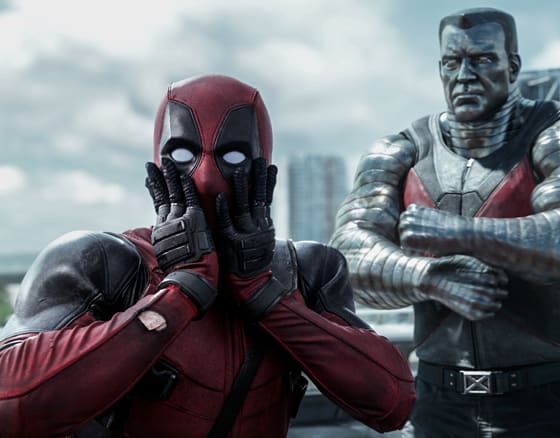Just when you thought Ryan Reynolds' career was down for the count, he returns to the silver screen as the titular masked vigilante in Deadpool, a movie that finds the former sitcom star-turned-Hollywood heartthrob at the height of his comedic game. It also may be the least bloated superhero flick to grace the silver screen since the Marvel Universe first appeared in cinemas around the start of the century.
Reprising the role he first played in 2009's entirely forgettable X-Men Origins: Wolverine, Reynolds stars as Wade, a former military man with a quick wit and acerbic attitude who, after being diagnosed with cancer, decides to undergo an experimental operation to save his life. However, it all turns out to be an elaborate cover up, with Wade and his fellow "patients" being transformed into mutants and planned to be sold off as slaves to the highest bidder.
Free from captivity but not the man he once was, Wade vows to seek vengeance against the people who changed him (namely Ajax, played by new Frank Martin and rising British star Ed Skrein) and reconnect with the woman he loves.
The plot is fairly straightforward, with Deadpool's origin being laid out between an overarching story tying all the action together. First-time feature-length director Tim Miller's stylized, Scott Pilgrim Vs. The World-esque flourishes make up for the film's more traditional moments (which makes sense, considering he was the aforementioned film's creative supervisor of visual effects), but it's Deadpool's dialogue that really steals the spotlight here.
Screenwriters Rhett Reese and Paul Wernick (Zombieland, G.I. Joe: Retaliation) have created a masterful script that perfectly captures the essence of the original comics, as well as the kind of acerbic language that's become somewhat synonymous with fans of the art form as a whole. At times, that level of precision when it comes to wordplay almost comes across as a little hackneyed, if not pandering (one needs to look only so far as the use of the term "asshats" in the opening credits for a cheap example), but Reynolds and his charming douchebaggery make even the most calculated lines sound as smooth as silk, and helps cement Deadpool as one of the more watchable outliers from its oeuvre.
(Fox)Reprising the role he first played in 2009's entirely forgettable X-Men Origins: Wolverine, Reynolds stars as Wade, a former military man with a quick wit and acerbic attitude who, after being diagnosed with cancer, decides to undergo an experimental operation to save his life. However, it all turns out to be an elaborate cover up, with Wade and his fellow "patients" being transformed into mutants and planned to be sold off as slaves to the highest bidder.
Free from captivity but not the man he once was, Wade vows to seek vengeance against the people who changed him (namely Ajax, played by new Frank Martin and rising British star Ed Skrein) and reconnect with the woman he loves.
The plot is fairly straightforward, with Deadpool's origin being laid out between an overarching story tying all the action together. First-time feature-length director Tim Miller's stylized, Scott Pilgrim Vs. The World-esque flourishes make up for the film's more traditional moments (which makes sense, considering he was the aforementioned film's creative supervisor of visual effects), but it's Deadpool's dialogue that really steals the spotlight here.
Screenwriters Rhett Reese and Paul Wernick (Zombieland, G.I. Joe: Retaliation) have created a masterful script that perfectly captures the essence of the original comics, as well as the kind of acerbic language that's become somewhat synonymous with fans of the art form as a whole. At times, that level of precision when it comes to wordplay almost comes across as a little hackneyed, if not pandering (one needs to look only so far as the use of the term "asshats" in the opening credits for a cheap example), but Reynolds and his charming douchebaggery make even the most calculated lines sound as smooth as silk, and helps cement Deadpool as one of the more watchable outliers from its oeuvre.
